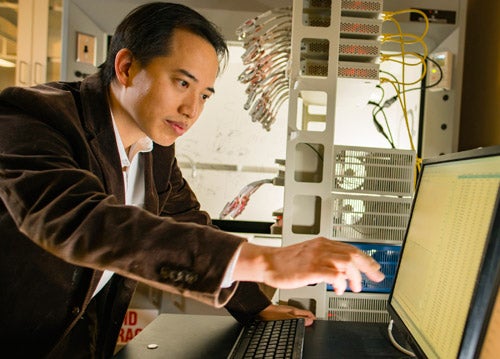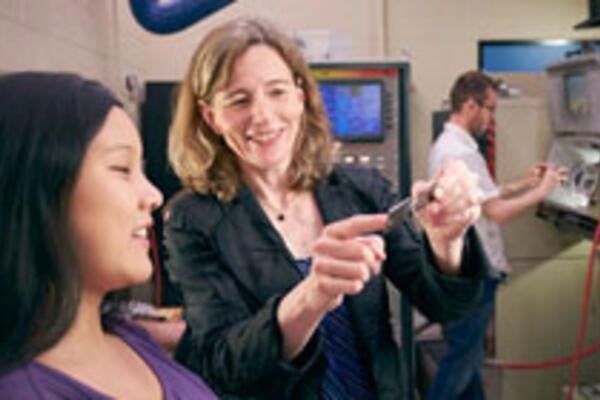
Rechargeable battery expert awarded prestigious Steacie honour
Engineering Professor Zhongwei Chen receives $250,000 fellowship grant to advance his research on low-cost, energy efficient batteries for a more sustainable economy

Engineering Professor Zhongwei Chen receives $250,000 fellowship grant to advance his research on low-cost, energy efficient batteries for a more sustainable economy
By Carol Truemner Faculty of EngineeringA University of Waterloo researcher is the recipient of an E.W.R Steacie Memorial Fellowship from the Natural Sciences and Engineering Research Council of Canada (NSERC) for his work in developing new materials that make batteries and fuel cells smaller, lighter and longer-lasting.

Photo credit: NSERC
Zhongwei Chen, a chemical engineering professor and the Canada Research Chair in Advanced Materials for Clean Energy, leads a team of engineering graduate students that is producing low-cost nanomaterials for fuel cells, batteries and supercapacitors. Their technology has the potential to lower the costs of fuel cells by reducing or even eliminating the need for precious metals such as platinum and palladium.
Announced today at Rideau Hall in Ottawa, Professor Chen is one of six Steacie Memorial Fellowship recipients. He plans to use his fellowship grant of $250,000 over two years to expand his team and advance his research.
Professor Chen’s partnership with the General Motors Global Research and Development Centre has produced a patented technology for fabricated silicon-based lithium-ion batteries with almost 10 times more energy. The technology would enable smartphones and other electronic devices to last 40 to 60 per cent longer between charges and electric cars to drive 500 kilometres further. As well, because silicon batteries are more lightweight than what is now on the market, the overall weight of an electric vehicle would be significantly reduced.
“More powerful batteries will transform how we produce and store renewable energy, which will allow the world to find meaningful alternatives to fossil fuels,” said Feridun Hamdullahpur, president and vice-chancellor of the University of Waterloo. ”I am very pleased to see NSERC recognize Professor Chen’s brilliant research resulting in an innovative technology. This is an excellent example of the high calibre of research being undertaken at Waterloo.”
Professor Chen’s startup company, WatTech Power Inc., is commercializing a rechargeable battery technology that turns intermittently available renewable energy sources, such as solar and wind power, into reliable sources of back-up power for regions that experience frequent power outages. By minimizing the amount of power purchased during high-cost periods, electricity bills are reduced.
“Waterloo Engineering is extremely pleased with the recognition of Zhongwei Chen’s contributions in creating more energy-efficient and substantially smaller batteries,” said Wayne Parker, acting dean of Waterloo Engineering. “This highly regarded fellowship will allow him to further focus on research that has the potential for major impacts throughout the world.”
The E.W.R. Steacie Memorial Fellowship honours the memory of Edgar William Richard Steacie, an outstanding chemist and research leader who made major contributions to the development of science in Canada during, and immediately following, World War II.

Read more
The Waterloo student team building the world’s first functional pneumatic hyperloop levitation system will share major milestone

Read more
Special issue of Waterloo Magazine celebrates women who lead, and explores equity in education and the workplace

Read more
Professor Mary Wells co-authors Women of Impact, a book about the lives of 18 women who work in mining, metallurgy and materials
Read
Engineering stories
Visit
Waterloo Engineering home
Contact
Waterloo Engineering
The University of Waterloo acknowledges that much of our work takes place on the traditional territory of the Neutral, Anishinaabeg, and Haudenosaunee peoples. Our main campus is situated on the Haldimand Tract, the land granted to the Six Nations that includes six miles on each side of the Grand River. Our active work toward reconciliation takes place across our campuses through research, learning, teaching, and community building, and is co-ordinated within the Office of Indigenous Relations.